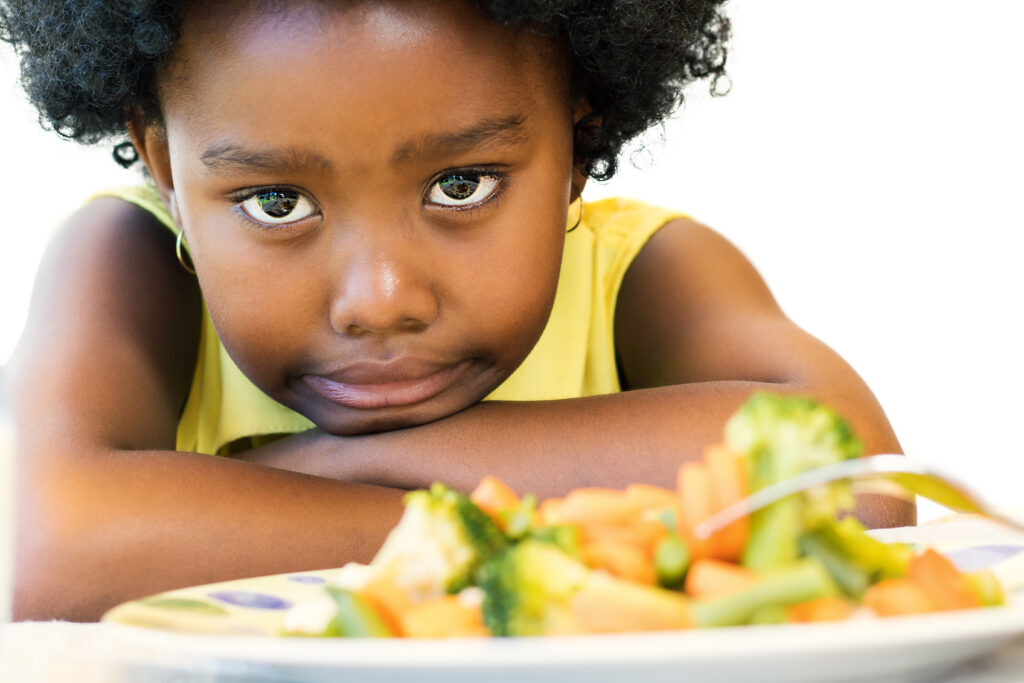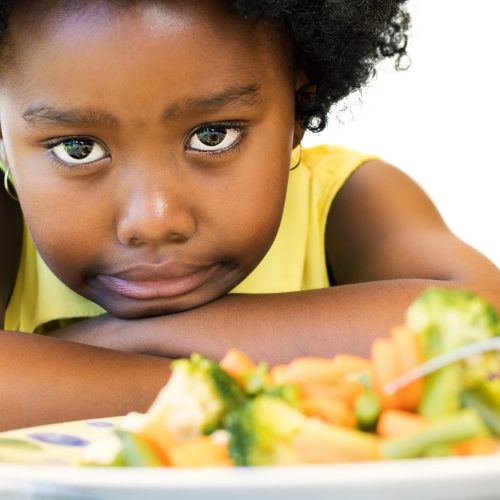The takeaways in this guide take 2 minutes to read. This guide will be updated again in August, 2021. Know something we should add? Email us.
These are big takeaways we have after reviewing research and interviews from 12 expert sources:
- Kids often genuinely don’t like the taste of vegetables, especially when they first try them. It can take up to 10 times of eating something for their taste buds to adjust. Several sources recommended showing your child that you too will try something new and different, and that it’s a normal thing that people do.
- Most sources cautioned against offering treats in exchange for eating healthier foods, as it can make the dessert seem like the goal instead of just enjoying their food. However, one expert broke down a study that found rewards CAN work when getting kids familiar with new tastes. In other words, it can help them get over the “this is a weird new taste” hump.
- Most sources cautioned against offering treats in exchange for eating healthier foods, as it can make the dessert seem like the goal instead of just enjoying their food. However, one expert broke down a study that found rewards CAN work when getting kids familiar with new tastes. In other words, it can help them get over the “this is a weird new taste” hump.
- One frequently recommended way (with some scientific evidence of success) of getting kids to eat more vegetables was having them participate in picking out the vegetables and then preparing them for dinner. The idea here is giving them a little control and ownership of the food they are eating can go a long way.
- Every source cautioned against nagging or forcing your child to clear their plate. That practice (so common in our youths) can end up teaching kids not to listen to their bodies to know when they are hungry or full.
- Interesting tidbit: The Zero to Three foundation recommended serving a small treat with dinner. Your child might eat that first and only that at the beginning, but their theory is that your child will eventually learn to view the treat as part of their meal and not the ultimate goal.
- Interesting tidbit: The Zero to Three foundation recommended serving a small treat with dinner. Your child might eat that first and only that at the beginning, but their theory is that your child will eventually learn to view the treat as part of their meal and not the ultimate goal.
- The American Academy of Pediatrics’ sample menu for a preschoolers has them eating a half cup of vegetables per day, spilt between lunch and dinner. That is about six baby carrots – not at all an adult sized portion of vegetables.
For more details on each of these takeaways, and signs of when picky eating is a real problem, see below.

Kids Really Don’t Like the Taste of Vegetables (At First)
Psychology Today — Edward Abramson, Ph.D.: Abramson argues that humans are programmed to not like sour or bitter tastes, as those were more likely to be poisonous in prehistoric times. So, when your child refuses vegetables, Abramson says they are “not being willful or malicious.” He says that it can take many introductions for a child to accept a new food, and cautions against pleading with them to try the new thing. Instead, he says, move on to another topic. Abramson says it could take 10 or more repetitions to get a child to try something new.
Psychology Today — Heidi Grant Halvorson, Ph.D.: Halvorson writes that psychologists like herself often warn against using rewards to encourage certain behaviors, because it can undermine a child’s “intrinsic motivation to do something they already enjoy or find meaningful.” But when it comes to vegetables, there often isn’t an “intrinisic motivation” to try a new food that might taste bitter or unfamiliar. Halvorson reviews a study of 400+ kids that found a reward (in this case, a sticker) for eating a vegetable they did not already like led to kids eating significantly more of that veggie months later, compared to a group that got no reward. And that happened even though there was no reward for either group the second time around. In other words, children who got rewards learned to tolerate or even like the taste of the vegetable, and would eat it without prompting.
American Academy of Pediatrics: The AAP says to keep offering a food several times, even if your child has rejected it, because it can “take as many as 10 or more times tasting a food before a toddler’s taste buds accept it.” They caution against bribing children with treats, which can make the dessert food more exciting and the dinner at their meal feel like a chore.
Psychology Today — Susan Albers, Psy.D.: Albers breaks down an analysis that looked at 120 studies on getting children to eat healthy foods to see any trends in what works and what doesn’t. What did show some signs of working: Showing your children that you also eat fruits and vegetables, and that you are willing to try new foods that you are unsure of how they will taste yourself.
Child Mind Institute – Rachel Busman Psy.D.: Busman recommends that families come up with a list of new foods that they can try together, to spread out the newness factor from just your child to everyone. Busman also recommends offering foods that have been rejected in the past, and modeling this yourself. Explain that you are giving something another chance, too.
Getting Kids Involved in Veggie Picking and Prep Helps
Psychology Today — Edward Abramson, Ph.D.: Abramson recommends asking your child how they would like the vegetable prepared to give them a sense of control over what they are eating. If you still find reluctance, have them help you prepare the vegetables.
Psychology Today — Susan Albers, Psy.D.: Albers breaks down an analysis that looked at 120 studies on getting children to eat healthy foods to see any trends in what works and what doesn’t. What did show some signs of working: Getting kids involved in the process of shopping, gardening, and/or cooking the vegetables, giving them a sense on control and ownership over the food.
American Academy of Pediatrics: They recommend letting your children exercise some control by letting them pick out what fruit and vegetables they’ll eat that day or at the grocery store. And they recommend using kid-friendly cookbooks to let your kids pick out a new veggie recipe.
Whatever You Do, Don’t Make Them Clear Their Plate
Psychology Today — Susan Albers, Psy.D.: Alberson breaks down an analysis that looked at 120 studies on getting children to eat healthy foods to see any trends in what works and what doesn’t. They found that trying to control or restrict children’s eating was counterproductive, as it can “override their internal cues of pleasure, hunger, and satiety.”
Child Mind Institute – Rachel Busman Psy.D.: Busman says it is normal for kids to go through picky eating states, especially when they are trying to exert control on other elements of their life (i.e. putting on their own coat, brushing their teeth). She says making a child sit at the table until their plate is empty is not effective. It stresses out both kids and parents, adding negative associations to eating.
Zero to Three: This group cautions against preparing special meals for your child, and instead serving them what you are eating. However, they do recommend serving that food with one thing the child knows and likes on the plate. They do not recommend forcing children to eat certain amounts, as that can teach them to rely on others to decide how much to eat instead of listening to their own bodies. They also recommend serving a small treat with dinner. They may eat that first and may not eat anything at all, but the researchers here say that’s okay and that “over time, your child will come to see that sweets are part of a meal, but not the only part.”
When Picky Eating Is a Real Problem
Child Mind Institute – Jerry Bubrick, PhD: Bubrick explains when picky eating goes beyond a normal stage and is a problem that requires professional help. He said picky eating can be a serious problem when kids are undernourished and their lack of acceptable foods is limiting their lives. Bubrick said that typically kids are 7 or 8 by the time they reach this state, and it is clear that it is not a phase of preschooler-hood. Bubrick’s first step is to understand what is motivating their food choices, and what they might be afraid of, with a specific focus on texture, taste, and smell. Then they begin exposure therapy. He has a rule that children can only reject something as not liking it if they have tried it three times.


